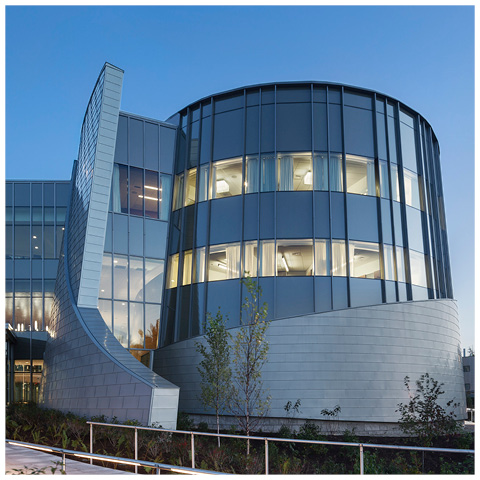The Jackson Laboratory (JAX) for Genomic Medicine supports a mission to discover precise genomic solutions for disease and to empower the global biomedical community in the shared quest to improve human health. Befitting this mission, JAX Genomic Medicine’s facility also was designed and built to support environmental health and occupant wellness. Certified LEED® Gold, the research center features sustainable, natural metal from RHEINZINK America Inc. to create the panels on both the exterior façade cladding and the interior walls.
JAX Genomic Medicine, constructed as part of the state’s Bioscience Connecticut Initiative, opened in 2014. Set on a 16-acre land parcel adjacent to the University of Connecticut’s Health Center campus, its location and staff facilitate clinical collaboration with the state’s many universities and hospitals.
Farmington has been recognized as one of the most desirable communities in Connecticut, positioned halfway between New York City and Boston. Along with its convenient location and compelling research, its state-of-the-art facility help JAX Genomic Medicine attract internationally renowned scientists.
Presenting a positive, first and lasting impression, the building consists of a structural steel frame faced with Canadian limestone, glass and 14,000 square feet of RHEINZINK-prePATINA blue-grey zinc material fabricated into panels by MetalTech-USA. Designed by Centerbrook Architects & Planners in concert with Tsoi Kobus Design, the four-story, 183,500-square-foot medical research facility offers 17 “wet” biology labs and 17 “dry” computer-based labs clustered for collaborative purposes with additional faculty offices, employee amenities, and vast spaces for large group gatherings.
Supporting LEED criteria, zinc is an environmentally friendly material because it is a 100% recyclable metal that can be reused indefinitely. Its trimmings are able to be recycled and the product also contains at least 10% post-consumer recycled content.
In addition to achieving the project’s sustainable goals, the design team’s intention was two-fold: first to design a striking facility and second, to conserve funds for science while remaining sophisticated enough to draw internationally renowned scientists.
Centerbrook’s associate principal, Andrew Santaniello, AIA, cited aesthetics and longevity as driving the choice of the exterior zinc cladding. He said, “The zinc ages well and becomes more beautiful as the building ages. It also was a cost-effective option for metal cladding used on the project.”
“RHEINZINK’s exterior zinc cladding met all of our goals for the design of The Jackson Laboratory of Genomic Medicine façade,” said Santaniello. “It is both aesthetically pleasing and practical. Its malleability was critical to the contouring of the exterior and it was also important to us and the client that it is durable and that its appearance, which was a great fit with the other external materials like limestone, actually improves with age.”
The blue-grey hue of the zinc was another critical factor in its specification as Centerbrook favored a varied palette of materials and finishes that would complement each other. “The limestone has blue veining that the blue-grey of the zinc was able to pick up,” added Santaniello. “It also subtly blended with the champagne and pewter colors of the aluminum curtainwall frame.”
The contours of the site provided significant design challenges and influenced the design’s shape to conform to a graceful arc, while allowing room for potential expansion as the lab continues to grow. The connecting joint of the existing facility and prospective wing is a distinctive oval structure visually wrapping inside, providing continuity and blurring the boundary between inside and out.
“Transparency was a big factor in the design of the building, and using the zinc on the interior again helps to create that continuity,” said Steve Palumbo, formerly with of Tsoi Kobus Design. He noted it took a “deliberate effort to align the panel sizes and seams between interior and exterior.”
Santaniello reiterated, “The zinc flat lock systems worked for our exterior and interior forms. It could be bent and formed in the field with the sloped and curving walls of the design, while allowing thermal expansion and contraction to occur.”
As MetalTech-USA’s project manager on JAX Genomic Medicine, Michael Love, worked closely with the architect, installing contractor Ernest Peterson, Inc., and RHEINZINK to ensure the desired alignment, aesthetic and performance. Love concluded, “The end result was a uniform and consistent look and I believe everyone was pleased. The final product looks terrific.”
**
The Jackson Laboratory for Genomic Medicine, 10 Discovery Dr, Farmington, CT 06032; https://www.jax.org/about-us/where-we-work/connecticut
- Owner: The Jackson Laboratory; Farmington, Connecticut; https://www.jax.org
- Architects:
- Centerbrook Architects & Planners, LLP; Centerbrook, Connecticut; https://centerbrook.com
- Tsoi Kobus Design; Boston; https://tsoikobus.design
- Installing contractor: Ernest Peterson, Inc.; Hartford, Connecticut
- Metal wall panels – architectural zinc fabricator and distributor: MetalTech-USA; Peachtree City, Georgia; metaltech-usa.com
- Metal wall panels – architectural zinc: RHEINZINK America, Inc.; Woburn, Massachusetts; www.rheinzink.us
- Photographer: Robert Benson Photography
